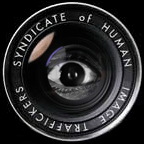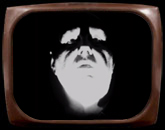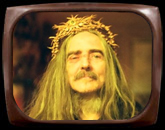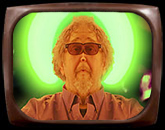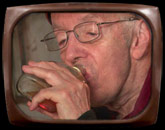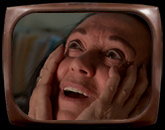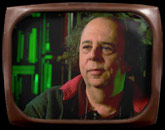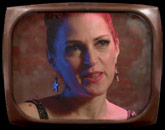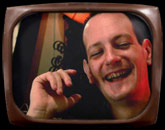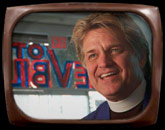
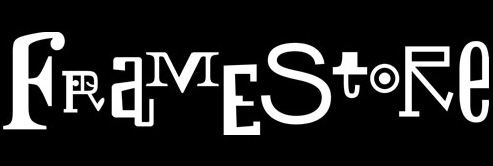
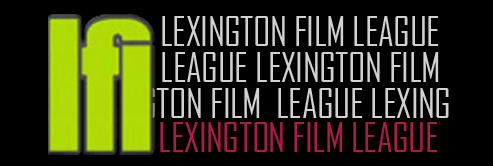

Downtown NYC existentialist playwright Richard Foreman (b. 1937) won a MacArthur Award, just as his wife, actress Kate Manheim, came down with a mysterious and painful illness. In a situation as excruciating as it is absurd, he grows moss at the sickbed of a dying wife who does not die. In this intimate short film, Foreman reflects on inspiration in a godless cosmos, the 20th Century avant-garde, and what art does not tell us about post-erotic love.
Richard Foreman has written, directed and designed over fifty of his own plays. He has received the Literature Award from the American Academy and Institute of Arts and Letters, a Lifetime Achievement in the Theater’ award from the National Endowment for the Arts, the PEN Club Master American Dramatist Award, a MacArthur ‘Genius’ Fellowship, and in 2004, he was elected officer of the Order of Arts and Letters of France. Five of his plays have received ‘OBIE’ awards as Best Play of the Year—and he has received five other ‘OBIE’S,’ including Best Director and Sustained Achievement. Foreman’s archives and work materials have been acquired by the Bobst Library of New York University.
Getting Out of Bed with Richard Foreman initially appeared as an article (see below) in Coilhouse Magazine. The article also contained a previous version of the film that ran for eleven minutes. This previous version was screened at Reelfest Boston and at the Microscope Gallery. The new and improved version (whose running time is now seven minutes) has been screened at the Howl Happening, at Reverb (Baltimore), and at the Gene Frankel Theatre as part of the Secrets of the Heart Film Festival along with nine other short films selected from among 340 international submissions.
Getting Out of Bed With Richard Foreman:
Love Among the Retro Avant-Garde
Storytelling is, among other things, the art of regulating the flow of information shared with an audience. Playwright Richard Foreman is a foremost master of this art, withholding much that makes our world familiar and meaningful. In his plays, we are thrust into a room – perhaps suggestive of the human psyche – where information circulates without context, and language often appears to lose its capacity to bear information or even conjure words. Characters inhabit situations and events transpire, but usually without the problem resolution endemic to most fiction. Ultimately, we never know whether what we have witnessed is satirical, psychological, resolutely absurdist, or somehow all three concurrently. Enduring such a bewildering circumstance, the audience is challenged to find or impose order and meaning – never knowing which they are doing. As you may well imagine, this is not easy art. It may leave the theatergoer uneasy – even queasy – amid buzzers, flashing lights, warped music, and the voice of un-reason. One may even wonder whether it’s akin to what Jeremy Bentham said of natural rights: “nonsense upon stilts.” If, however, the official tastemakers are to be believed, this is theatre operating at a high degree of abstraction, offering sly humor and curious insight into our social and inner worlds.
Richard Foreman’s Ontological-Hysteric Theater made its debut in 1968 – a year redolent with meaning for alternative culture – and his plays were a mainstay of the weird and wonderful East Village until 2010. He has written, directed, and designed more than fifty plays, received five “OBIE” (Off-Broadway) Awards for Best Play of the Year, the Literature Award from the American Academy and Institute of Arts and Letters, a Lifetime Achievement in the Theatre Award from the National Endowment for the Arts, the PEN Club Master American Dramatist Award, a MacArthur “Genius” Fellowship, was elected officer of the Order of Arts and Letters of France, and his direction of the 50th anniversary production of The Threepenny Opera was nominated for both T.O.N.Y. and Grammy Awards.
For nearly 20 years Foreman has launched his plays from a little theater on the grounds of the historic St. Mark’s Church-in-the-Bowery in New York City’s East Village. For those of us for whom an annual trek to Foreman’s demented dimension provides regular respite from worlds we are otherwise doomed to inhabit, I bear bad news: this year’s play is slated to be his last. And for those new to Foreman, or without the ability to see one of his plays in New York or when they tour Paris or Los Angeles or Berlin, there is good news: he will now be turning his prodigious talents exclusively to film making.
A blinkered guest in Foreman’s book, art, and technology engorged SOHO loft – one of the original lofts designed by George Maciunas – I feebly tossed feeble questions before the “Genius” himself. Despite his telling me that he “didn’t like people,” Foreman was a good sport, ruminating on whether alternative- and counter-cultures have futures, the keys to a vital art scene and to becoming an artist, the meta-politics of theatre, and his mystical yearnings. Alas, I still don’t understand why existentialists get out of bed in the morning. The Syndicate of Human Image Traffickers maintained surveillance (see above) and the remainder was captured by my electro-ear (see below).
S.H.I.T.
What first brought you to lower Manhattan?
Richard Foreman
I moved to lower Manhattan because, in the middle 1960s, I got friendly with Jonas Mekas, who was head of the underground film movement, and a close friend of his was George Maciunas, who was the head of Fluxus. At a certain point, George made his art setting up artists’ coops. It was totally illegal. I was coming down all the time to look at underground films. At one point, I told George that I was ready to take the risk and move downtown, and he got ten people to buy a building together. Starving artists did all the work of converting the manufacturing lofts into living lofts. I was going to films Jonas was showing all the time and, at one point, I dared to tell him that I was writing plays. I showed him a play. He allowed me to show it at his theater when the fire department closed it after they said that he didn’t have a proper license to show films, since it was a play.
S.H.I.T.
What makes for a vibrant artistic community?
Richard Foreman
At the time, we all believed that the world was going to change. The 1960s were the first time that I felt I could breathe freely in America. I grew up in the 1950s, which was a dreadful time. I was horrified by the people who put the 1960s down as a horrible aberration. I didn’t take a lot of drugs – I was scared to – but a lot of it happened because Timothy Leary “turned people on.” Drugs can ruin your life, but there is no question that it opened the possibilities for a lot of previously uptight people.
S.H.I.T.
Aldous Huxley’s Doors of Perception. What would counterculture mean in the 21st Century?
Richard Foreman
I have no idea. I don ‘t think there will be any counterculture. Things are too well organized, with the bottom line, but who knows about the economy? I’m in no position to predict. I certainly don’t like the direction American culture [has been] headed for the past 20 years.
S.H.I.T.
Do you seek out any artists or venues that you think are countercultural?
Richard Foreman
No. I’m a hermit. If I wasn’t doing plays, which I will stop in a while, I would write films by myself and not see anybody. For a while, that was why I wrote plays. I’ve always been ambivalent about the theater, but I know that without forcing myself to work with people during rehearsal and performance, I would see too few people for it to be healthy for me. I don’t go out and seek things. I haven’t gone to theater in years – except maybe once or twice a year – [as] I don’t like sitting amongst all those people. I watch movies at home. Art is terribly important for me, but I just read the magazines. I rarely go to galleries or museums.
S.H.I.T.
Regarding Brecht, your theater, with some exceptions, is not overtly political. Where do you see the relationship between art and politics?
Richard Foreman
Back in the ’70s and ’80s, some people would aggressively complain that I was too aesthetic. I would reply, that, in America, reactionary psychological mindsets came because people were afraid of not being able to make clear, easy distinctions. I always thought that training that everything in life is a mixture of black and white is a kind of mentality that produced progressively-oriented human beings. So, I always thought that my work was political in that it trained people to be open.
S.H.I.T.
Your theater has a very distinct, disorienting look about it. Oddly enough, I’ve always found it reminiscent of some dreams I had as an adolescent. What do you hope to accomplish? Do you want to jar people from their beliefs or entertain them?
Richard Foreman
I honestly don’t want to do anything to them. All of us have many people inside us: the person your parents made, the person your school made, the person you made yourself, and so on.
One of the lower parts of me, an upper-middle class Jewish boy, wants to be a success. The part that makes art couldn’t care less. That part does the art for himself without a concern for how it affects other people. I try to engage in a conversation about art that’s been ongoing in the West for two thousand years. Certain things are missing in my life and in the culture. I want to make paradise for myself by filling these gaps. If other people can derive benefit from it, that’s great, but I don’t make it for them. I’m oriented to the artistic possibilities that have been created and I’ve been influenced by everyone I’ve read, every piece of art I’ve seen. Sometimes I think that I have the answer, but I eventually become revolted by what I’m creating, as if I’d eaten too much chocolate cake. I try to pay attention to what is really going on when I’m making something. I try to close myself off from everything when I’m creating.
S.H.I.T.
In Astronome: A Night at the Opera, there is a score by John Zorn, the distribution of ear plugs and multiple warnings. Is your need to warn your audience actually a disappointment in them? In us? Do the warnings defeat the effect you hope to have?
Richard Foreman
Absolutely not. I need them. I always try to treat the audience as gently as possible. When I was 30, I wouldn’t have. I liked listening to LaMonte Young while sitting next to the speakers. There are many people in my audience who are going to have a hard time with many aspects of my plays and I want to make it as comfortable as possible for them. I don’t want to attack them, despite what people might think. Like the bright lights in people’s eyes. I find it beautiful. I find it like Turner’s paintings.
S.H.I.T.
I find it hypnotic. It leads me into a quasi-dreamstate.
Richard Foreman
That’s OK, too. That’s like Turner, in a way. The idea that light, which we think of as revealing, can blind us also has spiritual and philosophical implications.
S.H.I.T.
For forms of knowledge and knowing?
Richard Foreman
For getting past forms of knowledge. Knowledge is not the place you want to arrive. It’s a distance from reality.
S.H.I.T.
Knowledge is a series of presuppositions. How can you act in the world without concepts and presuppositions?
Richard Foreman
You can’t. It’s a step toward the impossible, but art can be an attempt to take a step toward the impossible. I’m driven by an unquenchable longing for something I can’t quite define and I know that I can’t achieve.
S.H.I.T.
Yours is a mystical quest?
Richard Foreman
In a way. So much of 20th Century art is secretly mystical.
S.H.I.T.
Where do you look for inspiration today?
Richard Foreman
I’ve always read lots of philosophy, psychoanalysis, some poetry, [and] aesthetics. I look at paintings. I listen to music, although not as much as I used to, and I look at a lot of film. Even films that I think are great, I have a hard time watching for more than 15 minutes. I can recommend a book I’ve been reading and re-reading for the past five years. It’s a work by a pre-Socratic, mystically-oriented author: Peter Kingsley’s Reality. It’s evil of me, but I’m more influenced by Lacan than Freud.
S.H.I.T.
Hence, your seeing life as a yearning to fill a lack that, by definition, cannot be filled.
Richard Foreman
Yes. We’re all broken people. Lacan and so many French thinkers, note that we are imprisoned by language.
S.H.I.T.
Language, at its root, is communication.
Richard Foreman
Yes, but it’s also a prison determining what you will communicate.
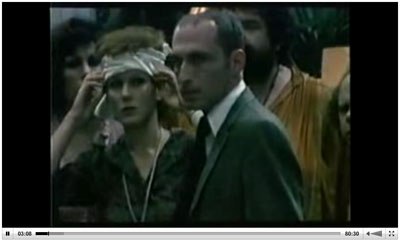
Strong Medicine (with Carol Cane, Raul Julia, & Buck Henry)
The Syndicate of Human Image Traffickers Thanks You For Your Time and Interest
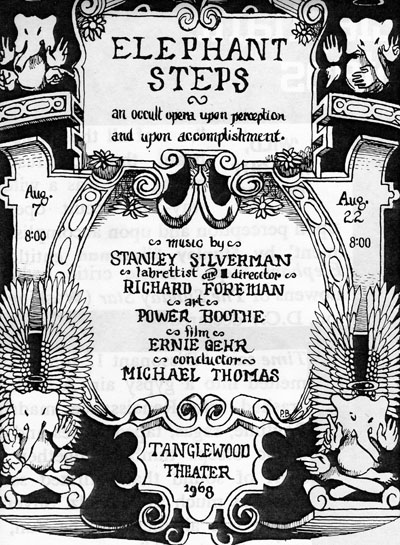
Foreman directs at Tanglewood, 1968
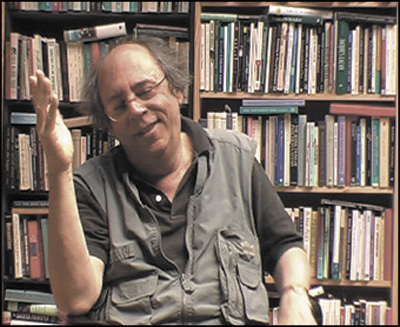
Photo via Real Time Arts
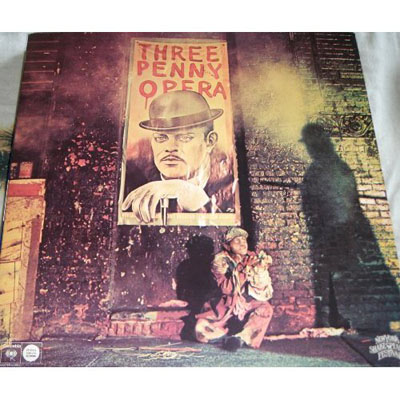
Richard Foreman directs the 50th anniversary production of Berrtold Brecht’s masterpiece.
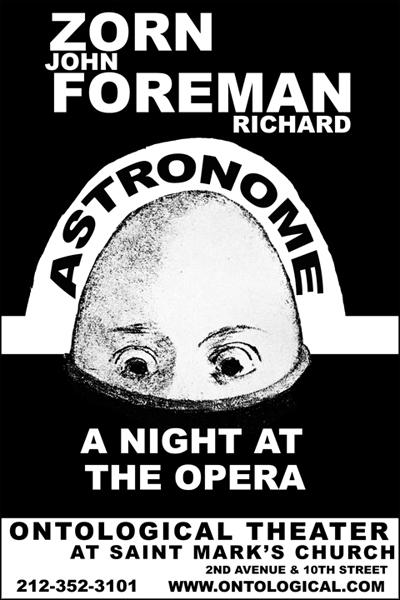
Astronome: A Night at the Opera (2009)
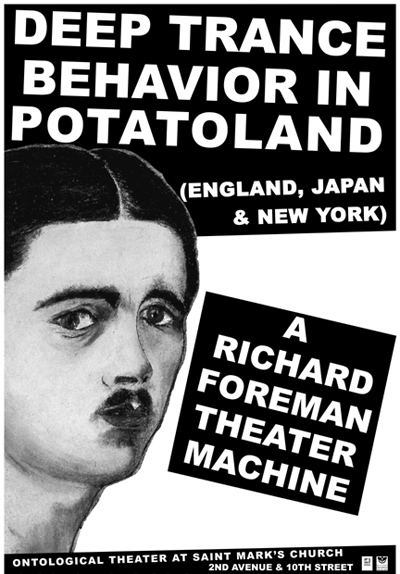
Deep Trance Behavior in Potatoland
